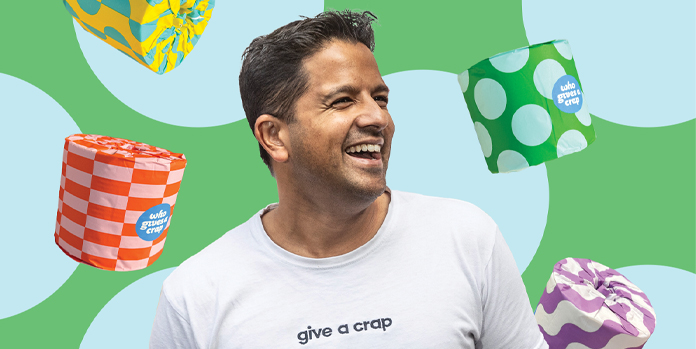“Unbelievably, more people in the world have access to a mobile phone than to a toilet”, says Jehan Ratnatunga (OM 2000), co-founder of Who Gives a Crap – the Melbourne-based company that donates 50% of profits to improve sanitation and access to clean water in the developing world. Since launching in 2012, the company has donated more than $18 million to this cause, and become a household name.
The winding path to successful start-up
“My career path definitely wasn’t a traditional one,” Jehan says. With qualifications in mechatronics engineering and computer science, and after a stint at General Motors, he began working at the Boston Consulting Group. There, he met Simon Griffiths, who would end up becoming one of the three Who Gives a Crap co-founders.
“Both Simon and I were interested in starting a business based around everyday things that also gave back to the community and was good for the planet,” he says. “The lightbulb moment came in 2009 when Simon said: ‘Why don’t we sell toilet paper to build toilets?’ and it all just came together from that.”
Later, Jehan and Simon joined forces with Danny Alexander, but it would take three more years of planning before their business was launched in 2012 through a crowd funding campaign. Who Gives a Crap now provides direct delivery of toilet paper, tissues, garbage bags and more across 38 countries with warehouses in Australia, the United Kingdom, the United States and the Netherlands.
The group thought carefully about how to market their product before landing on their distinctive light-hearted approach. “Our goal was to tackle a serious problem – the terrible outcomes that result from poor sanitation and lack of access to toilets and clean water – in a non-serious way,” Jehan explains. “We found that by motivating people with humour, rather than guilt, we could have a much better conversation with our customers, and they were more motivated to talk about our products with the people around them.”
Who Gives a Crap was able to turn even the outbreak of COVID-19, when toilet paper was in scarce supply in supermarkets, into an opportunity for positive change. “We were caught off guard like everyone else,” Jehan says. “But we came up with some creative ways to get toilet paper to more people, and that actually became one of our biggest ever donation moments.”
How sanitation transforms communities
Today, with electronic vehicles used for delivery, solar panels powering the warehouse, and products made from both bamboo and recycled paper, sustainability underpins the company’s entire business model. “It wouldn’t make sense if our products weren’t sustainable,” Jehan says. “We’ve even arranged to spell out ‘We Give a Crap’ in solar panels on our Australian warehouse roof. It’s important to us to bring both sustainability and a sense of fun to everything we do.”
For Jehan, the desire to help others was embedded in his family and life at Melbourne Grammar, then reinforced by the people he met as his career progressed. “Early on, in my mind, helping others was important, but earning a living was a separate thing,” Jehan explains. “I’m fortunate to have met people who showed me it was possible to do both at once.”
With around 40% of people on the planet still not having access to a toilet, Jehan says sanitation impacts every aspect of a community, from school attendance to life expectancy and to simple human dignity, adding that this is a challenge with a straightforward solution. “Aid organisations can build low-cost toilets – it’s funding that’s the issue,” he explains.
Who Gives a Crap provides unrestricted funding to carefully selected partner organisations enabling them to implement solutions where they are needed most. “One of our longest standing partners is Water Aid, and recently they took us to see their work in Cambodia, where they’re improving hospital sanitation,” Jehan says. “You can’t appreciate impacts like these from the other side of the world, but seeing their work in person, I was in awe of the difference they’re making.
“I definitely feel an immense sense of gratitude that I can spend time working on these problems on one side of the world, and reach out to somebody on the other side of the world and help them,” Jehan says. “It makes me feel like the world has become a smaller place.”



